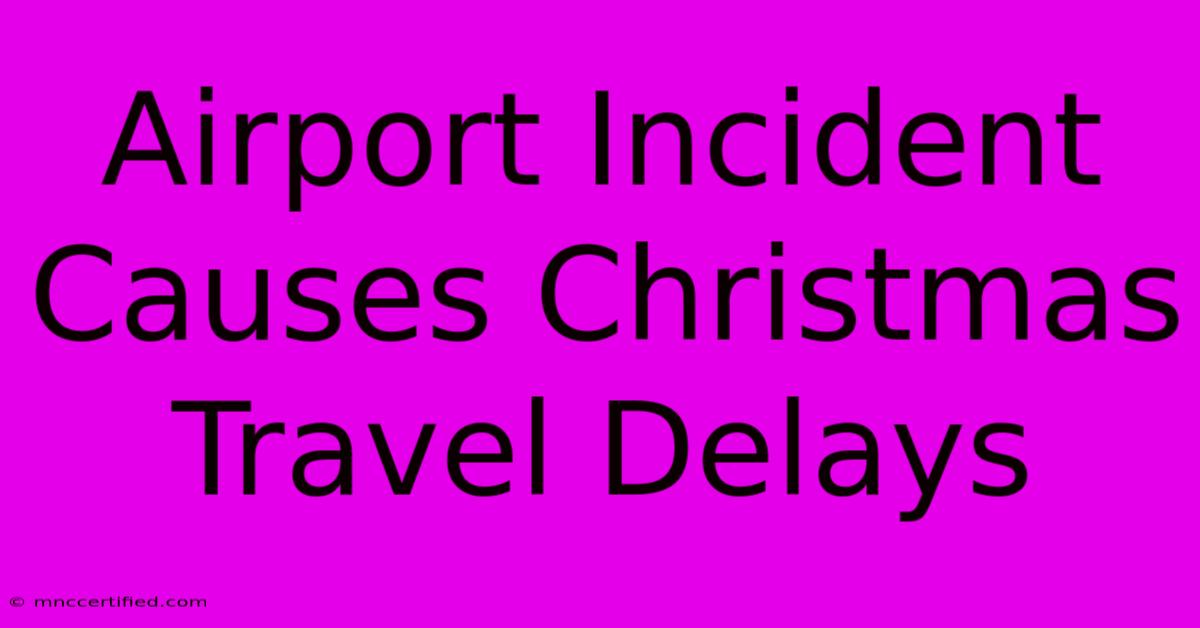Airport Incident Causes Christmas Travel Delays

Table of Contents
Airport Incident Causes Christmas Travel Delays: Chaos and Cancellations
This Christmas, many travelers experienced significant disruptions due to a major airport incident that caused widespread travel delays and cancellations. The incident, which involved [Insert specific cause of the incident here – e.g., a power outage, a snowstorm, a security breach], brought air travel to a standstill at [Airport Name] and had a ripple effect across the country, leaving countless passengers stranded and ruining holiday plans. This article will delve into the causes of the disruption, the impact it had on travelers, and what measures airports and airlines are taking to mitigate future occurrences.
Understanding the Root Cause: [Specific Incident Details]
The primary cause of the widespread Christmas travel delays was a [Detailed explanation of the incident, including specific details such as time, location, and contributing factors. Be precise and factual.]. This led to [Explain the immediate consequences – e.g., grounded flights, baggage handling issues, terminal closures]. The incident's severity was exacerbated by [Explain contributing factors – e.g., high passenger volume during peak travel season, inadequate backup systems, poor weather conditions]. This cascading effect highlighted the vulnerability of the air travel system to even relatively minor disruptions during periods of high demand.
The Impact on Passengers: Stranded and Disappointed
The consequences for passengers were severe. Thousands of flights were delayed or cancelled, leaving countless travelers stranded at airports, in hotels, or even at their departure points. Many missed planned Christmas gatherings with family and friends, while others faced significant financial losses due to cancelled bookings and accommodation costs. The emotional toll of such disruptions cannot be understated, with many passengers expressing frustration and anger at the lack of clear communication and support from airlines and airport authorities. Stories of passengers sleeping on airport floors, facing long queues for rebooking, and enduring significant delays quickly spread across social media, highlighting the scale of the problem.
Airline and Airport Response: A Mixed Bag
The response from airlines and airport authorities varied. Some airlines were praised for their proactive communication and efforts to rebook passengers and provide assistance, while others were criticized for their lack of transparency and inadequate support. [Mention specific airlines and their responses - positive and negative. Cite credible news sources]. The airport itself [Describe the airport's response, including measures taken to alleviate the situation – e.g., providing refreshments, additional staff, etc.]. However, many felt the response was too slow and insufficient to address the scale of the problem.
Lessons Learned and Future Mitigation Strategies
This Christmas travel chaos underscores the critical need for enhanced resilience within the air travel system. Key lessons learned include the need for [List specific improvements – e.g., improved communication systems, more robust backup power systems, better weather preparedness, enhanced passenger support protocols]. Airports and airlines need to invest in improved infrastructure and contingency plans to minimize the impact of future disruptions. This includes [Specific strategies – e.g., investing in more efficient baggage handling systems, improving weather forecasting and response capabilities, enhancing staff training, and developing comprehensive emergency response plans]. Ultimately, a more coordinated and proactive approach is crucial to ensure smoother and less stressful travel experiences for passengers.
Conclusion: Preparing for Future Travel
The Christmas travel delays serve as a stark reminder of the fragility of air travel and the significant impact even minor disruptions can have on countless lives. While we hope such events are rare, it is crucial that airports, airlines, and government authorities learn from this experience and take proactive steps to mitigate future risks. For travelers, the key takeaway is the importance of [Advice for travelers – e.g., booking travel insurance, checking flight statuses regularly, allowing ample time for travel, and having backup plans]. By learning from the past, we can work towards a more resilient and passenger-centric air travel system.
Keywords: Airport Incident, Christmas Travel Delays, Flight Cancellations, Flight Delays, Airport Disruption, Travel Chaos, Airline Response, Airport Response, Passenger Rights, Travel Tips, Air Travel Safety, [Airport Name], [Airline Names]
Note: Remember to replace the bracketed information with specific details relevant to the actual incident. Thoroughly research and cite reliable news sources to support your claims. Use internal and external linking to boost SEO.

Thank you for visiting our website wich cover about Airport Incident Causes Christmas Travel Delays. We hope the information provided has been useful to you. Feel free to contact us if you have any questions or need further assistance. See you next time and dont miss to bookmark.
Featured Posts
-
Lions Rout Bears 34 17 Dec 22 2024
Dec 23, 2024
-
Falcons Win Penix Jr Excels Against Giants
Dec 23, 2024
-
Aer Lingus Belfast City Hard Landing
Dec 23, 2024
-
Panama Canal Trumps Potential Actions
Dec 23, 2024
-
Ohio Wrestling Beats Gardner Webb
Dec 23, 2024